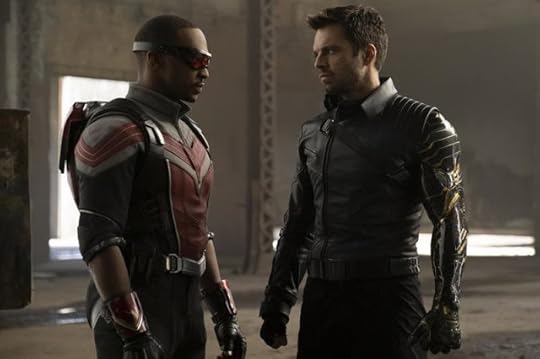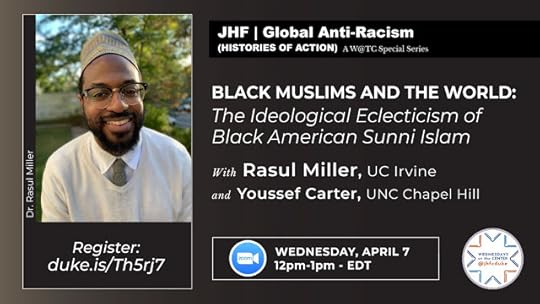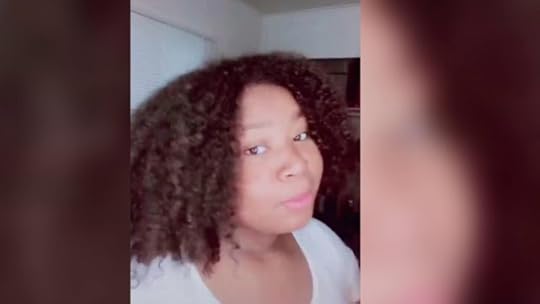Mark Anthony Neal's Blog, page 226
April 28, 2021
New Wave of Black Superheroes Are Taking Over the Small and Big Screen

'In the recent Disney+ series The Falcon and the Winter Soldier, actor Anthony Mackie’s Sam Wilson—better known by his superhero alias, Falcon—picks up the mantle, or rather shield, of Captain America from actor Chris Evans’s Steve Rogers. Mackie’s star-spangled Captain America is part of a new wave of Black superheroes on the big and small screen as well as splashed on the pages of comic books in recent years, from Marvel’s 2018 blockbuster Black Panther to HBO’s critically-acclaimed Watchmen to Netflix’s imaginative The Umbrella Academy. For more on this, The Takeaway spoke to Adilifu Nama, a professor of African-American Studies at Loyola Marymount University and author of the books Super Black: American Pop Culture and Black Superheroes and I Wonder U: How Prince Went Beyond Race and Back.'
April 27, 2021
'Black Girl Songbook' – Chapter 8: Black California Girls, Featuring Anita Pointer and Cari Champion

"Danyel Smith, notable Oakland enthusiast, dedicates this episode to the state she adores. From the girls to the warm weather, she lays out why California is the best state and what makes it so special. She’s joined by Anita Pointer of the Pointer Sisters to talk about pioneering their unique style and growing up in Oakland. Later on, Cari Champion joins to talk about her experience being Black in Los Angeles."
April 26, 2021
Principals Show Bias in Responses to Black parents, New Study Finds
 Principals show bias in responses to Black parents, new study finds was originally published by Chalkbeat, a nonprofit news organization covering public education.
Principals show bias in responses to Black parents, new study finds
Matt Barnum, Chalkbeat Apr 26, 6:00am EDT
Principals show bias in responses to Black parents, new study finds was originally published by Chalkbeat, a nonprofit news organization covering public education.
Principals show bias in responses to Black parents, new study finds
Matt Barnum, Chalkbeat Apr 26, 6:00am EDT A few years ago, thousands of high school principals across the country received a variation of the same email from a parent asking for “any information you can provide about enrolling.”
When the email was sent by “Emily Walsh” seeking to enroll her son “Greg,” 64% of principals responded. But when an identical message came from “Tamika Washington” with a son named “Jamal,” the response rate fell to 57%.
The emails were actually sent by two political scientists, Zachary Oberfield and Matthew Incantalupo, in an effort to gauge racial bias in public schools. Their findings — that principals are less likely to respond to parents who they may have assumed were Black — illustrate one way that bias plays out in schools nationwide, aligning with past research as well as the experiences of many families.
“We wanted an easy ask,” said Incantalupo, a professor at Yeshiva University. “If they’re throwing down hurdles for something as simple as this, it’s not too much of an inference to say there are probably other ways in which inequality manifests in these schools.”
The new paper, published last month, looks at responses from a nationally representative sample of 3,600 high school principals.
White principals, in particular, showed signs of discrimination: They were 9 percentage points less likely to respond to emails from a parent whose name suggested they were Black. Their behavior shapes national trends, as nearly four in five public school principals are white.
“Principals — just like teachers, just like everyone else — have the potential to harbor explicit or implicit racial biases that impact how they run their schools,” said Francis Pearman, a Stanford University professor whose own work has shown a link between bias in a community and test score gaps in schools.
Ivory Toldson, a professor at Howard University’s school of education, said some of this response gap likely reflects harmful stereotypes about Black students, fueled by exaggerated statistics like the (false) claim that there are more Black men in prison than in college. “Schools are more ready to accept statistics that paint Black students in a negative light,” Toldson said.
But evidence of discrimination vanished when the email said the child either “struggles” or “excels” in school. In those cases, principals were equally likely to respond to parents likely to be perceived as Black and white.
What explains this? Researchers suggest that stereotypes thrive in a vacuum of knowledge. Principals, “in the absence of information about student ability, tended to ascribe negative characteristics to the Black student,” Oberfield and Incantalupo write. When more information is provided, though, principals may have been less likely to fall back on racist assumptions.
Still, principals responded at lower rates overall to parents who said that their child struggled, a worrying phenomenon itself. (Principals were also less likely to reply to parents who indicated that their child did well in school — perhaps out of wariness of “helicopter parents.”)
The study also homed in on charter schools, which have sometimes been accused of erecting barriers to access. But there was no evidence that charter leaders were more biased. Charter school principals were 4 percentage points less likely to respond to Black parents, a gap similar to district school leaders.
In 2018, a similar paper found that parents looking to apply to a school were less likely to get a response if they indicated their child had received poor grades, had a disability, or had behavioral issues. In that study, charter schools in particular were less likely to respond when told the student had a disability.
That research also found that Black families were two percentage points less likely to receive a response that researchers saw as “encouraging.”
Recent studies have documented many other kinds of bias against Black students in schools. Black students are suspended for longer periods of time, even when involved in the same incident as white students. Black children are less likely to be referred to gifted and talented programs. They are less likely to receive the same special education services that white students do.
Teachers give writing samples lower scores if they’re primed to believe the author is Black, and they have less optimistic views about the likelihood that Black students will succeed in college.
The differences vary in size, and sometimes are small. But they add up.
“That small percentage point increase, when you extrapolate that across the universe of U.S. schools — that’s a significant number of students,” said Pearman, referring to the latest study.
Perhaps because of this accumulated discrimination, test-score gaps between Black and white students tend to be slightly larger in areas where there is greater racial bias, whether among teachers or the broader community.
Oberfield hopes the results reach school leaders and encourage them to consider their own actions more carefully. “If you’re the average principal,” he said, “I think knowing about a finding like this might be a check.”
***
Chalkbeat is a nonprofit news site covering educational change in public schools.
[image error]Re-Imagining Public Safety: A World Without Police

"Daunte, Ma’Khia, Andrew, Anthony. The list keeps growing. Is it time to abolish the police? On this episode of “Be Heard Talk,” Selena Hill, Evan Mastrondari, and special guest activist and author Brea Baker will discuss the call to abolish the police." -- Black Enterprise
Black Muslims and the World: Rasul Miller on The Ideological Eclecticism of Black American Sunni Islam

"In a Wednesdays at the Center virtual event, Rasul Miller, Assistant Professor of History at the University of California Irvine, spoke about the lives and legacies of Shaykh Daoud Faisal and Mother Khadijah Faisal, the founders of the Islamic Mission of America, one of New York City’s oldest mosques. The event was introduced by Youssef Carter, Assistant Professor of Religious Studies at the University of North Carolina at Chapel Hill." -- John Hope Franklin Center at Duke University
April 24, 2021
"You see a lot of people doing acrobatics to show why Ma’Khia deserved to die, not why she deserved to live": On the Adultification of Black Girls

"The fatal police shooting of 16-year-old Ma’Khia Bryant is sparking demands for accountability and igniting conversation about how race and gender played a role in the way law enforcement interacted with her. Dr. Monique W. Morris, President and CEO of “Grantmakers for Girls of Color” and Author of "PUSHOUT: The Criminalization of Black Girls in Schools", Treva Lindsey, Professor of Women’s Studies at Ohio State University, and Brittney Cooper, Author of Eloquent Rage: A Black Feminist Discovers Her Superpower, and Associate Professor of Women's and Gender Studies and Africana Studies at Rutgers University joined American Voices with Alicia Menendez." -- American Voices
Communities of Color and Other Buyers, Beware of Bold Promises from Health Insurers by Dr. Benjamin F. Chavis, Jr.

Communities of Color and Other Buyers, Beware of Bold Promises from Health Insurers
by Dr. Benjamin F. Chavis, Jr. | @DrBenChavis | special to NewBlackMan (in Exile)
The COVID-19 pandemic has brought issues of healthcare equity to the forefront of discussions of racial justice. Even when controlling for factors like age and income, communities of color have been much more severely impacted that white Americans.
A recent report by the Kaiser Family Foundation found that “older Black, Hispanic, and American Indian/Alaska Native adults were nearly twice as likely to die of COVID-19 as older White adults,” and “cases among Black and Hispanic Medicare beneficiaries were 1.6 times higher than the rate observed among White beneficiaries.”
Access to healthcare and health insurance is a vital issue for African Americans. And it’s important to be on the lookout for healthcare companies that make big promises but fail to deliver.
In this context, let’s take a look at Oscar Health, an insurance company that tries to appeal to consumers by positioning itself as a tech company. But its track record is questionable at best.
The company has been investigated and fined by the NY State Department of Financial Services. During its expansion in New York, Oscar cut the number of doctors in its network by more than half.
The company also has connections to former Trump Administration officials. It was founded by Jared Kushner’s brother Josh, and its parent company, Thrive Capital, was partly owned by Kushner until he took a job at the White House. And the company is run by serial Wall Street investors who seem primarily interested in flipping companies for a profit.
Even more concerning, Oscar has been expanding into the Medicare Advantage program, where they can leverage taxpayer money to provide health coverage to our seniors. That means one of our most vulnerable communities could be opting into a company that has questions hanging over it.
African Americans clearly need better health insurance. But we can’t get lured in by companies that are more interested in taking money than providing real healthcare benefits.
So, before you make a decision about health insurance, please get more than one opinion or option. There are healthcare insurance companies that are considerably more equitable and beneficial. Healthcare for all is both a fundamental civil and human right.
***
Dr. Benjamin F. Chavis, Jr. is President and CEO of the National Newspaper Publishers Association (NNPA) and Executive Producer and Host of The Chavis Chronicles (TCC) broadcast weekly on PBS TV stations throughout the United States.
@font-face {font-family:Helvetica; panose-1:0 0 0 0 0 0 0 0 0 0; mso-font-charset:0; mso-generic-font-family:auto; mso-font-pitch:variable; mso-font-signature:-536870145 1342208091 0 0 415 0;}@font-face {font-family:"Cambria Math"; panose-1:2 4 5 3 5 4 6 3 2 4; mso-font-charset:0; mso-generic-font-family:roman; mso-font-pitch:variable; mso-font-signature:3 0 0 0 1 0;}@font-face {font-family:Calibri; panose-1:2 15 5 2 2 2 4 3 2 4; mso-font-charset:0; mso-generic-font-family:swiss; mso-font-pitch:variable; mso-font-signature:-536859905 -1073732485 9 0 511 0;}p.MsoNormal, li.MsoNormal, div.MsoNormal {mso-style-unhide:no; mso-style-qformat:yes; mso-style-parent:""; margin:0in; mso-pagination:widow-orphan; font-size:12.0pt; font-family:"Calibri",sans-serif; mso-ascii-font-family:Calibri; mso-ascii-theme-font:minor-latin; mso-fareast-font-family:Calibri; mso-fareast-theme-font:minor-latin; mso-hansi-font-family:Calibri; mso-hansi-theme-font:minor-latin; mso-bidi-font-family:"Times New Roman"; mso-bidi-theme-font:minor-bidi;}.MsoChpDefault {mso-style-type:export-only; mso-default-props:yes; font-family:"Calibri",sans-serif; mso-ascii-font-family:Calibri; mso-ascii-theme-font:minor-latin; mso-fareast-font-family:Calibri; mso-fareast-theme-font:minor-latin; mso-hansi-font-family:Calibri; mso-hansi-theme-font:minor-latin; mso-bidi-font-family:"Times New Roman"; mso-bidi-theme-font:minor-bidi;}div.WordSection1 {page:WordSection1;}
Radio New Frame: Under the influence of influencers

"Everyone can be a social media influencer in a hyper-capitalist society. What comes next in advertising? Also, we look at the sinister side of the internet economy. Featuring guests Gordon Cook and Adam Haupt, Radio New Frame is hosted by Charles Leonard."
Why South Africa is Still So Segregated

"For decades, South Africa was under apartheid: a series of laws that divided people by race. Then, in the 1990s, those laws were dismantled. But many of the barriers they created continue to divide South Africans by skin color - which in turn determines their quality of life, access to jobs, and wealth. Racial division was built into the fabric of cities throughout South Africa, and it still hasn't been uprooted. That's partly because, while apartheid was the culmination of South Africa's racial divisions, it wasn't the beginning of them. That story starts closer to the 1800s, when the British built a network of railroads that transformed the region's economy into one that excluded most Black people -- and then made that exclusion the law." -- Vox
How L.A.'s Container Ship Logjam Highlights Larger Pandemic Supply-Chain Issues

"An average of 30 container ships a day have been stuck outside the Ports of Los Angeles and Long Beach just waiting to deliver their goods. The backlog is part of a global supply-chain mess spurred by the pandemic that means consumers could see delivery delays for weeks." -- Wall Street Journal
Mark Anthony Neal's Blog
- Mark Anthony Neal's profile
- 30 followers



